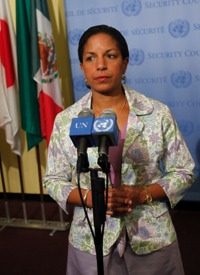
According to VOA, the draft resolution condemns North Korea’s tests, and it charges that North Korea violated previous UN resolutions. The resolution also imposes additional sanctions against the Pyongyang regime, including cargo inspections, a total arms embargo, and stronger financial sanctions. China reportedly favored making the cargo-inspection provision discretionary.
AFP reported that the resolution is widely expected to be endorsed at a vote by the end of the week.
U.S. Ambassador to the UN Susan Rice led the negotiations and presented the draft to the full 15-member council. Rice said the proposed resolution sends a "very strong, very credible and very appropriate" response to North Korea’s actions.
U.S. Defense Secretary Robert Gates told reporters in Brussels on June 11 that it does not appear that North Korea is making preparations to launch a military strike in retaliation to the proposed UN sanctions. Pyongyang’s had previously threatened to do so, however, Gates said North Korea’s unpredictable nature makes it impossible to dismiss the threats.
The same day that the resolution was drafted, Chinese foreign ministry spokesman Qin Gang urged restraint, telling reporters, "We always believe that the Security Council should pass an appropriate and balanced resolution which is conducive to promoting the denuclearization on the Korean peninsula," adding that the resolution should help "safeguard peace and stability in northeast Asia."
Russia’s state Itar-Tass news agency quoted a foreign ministry source’s optimistic reaction: "The resolution is being adopted in order to solve the problem, and not to whip up the situation. We don’t expect any actions to follow, including from North Korea, that would lead to an escalation of tension."
The Security Council resolution comes at a time of heightened tensions between North Korea and most other nations. As Russian journalist and Korean specialist Andrei Lankov began an op-ed piece in the New York Times for June 12 entitled "Why Beijing Props Up Pyongyang":
The situation around North Korea is deteriorating fast. A missile launch in April was followed by an underground nuclear test in May, and an intercontinental ballistic missile seems to be on its way to the launch pad. Two American journalists arrested in North Korea received an unusually harsh prison sentence, and North Korea has made new demands that are bound to undermine the last surviving North-South cooperation project.
Lankov observed that Westerners often look to China — as Pyongyang’s leading trading partner and generous foreign-aid benefactor — to serve as a moderating influence against the smaller communist state’s often rogue-like behavior. He states that "Beijing has taken an increasingly critical stance on Pyongyang’s nuclear program and supported a strongly worded U.N. resolution on the nuclear test."
However, Lankov does not place much stock in relying on China to police Pyongyang’s threatening policies. Among the negative factors — from China’s perspective — in cracking down too stringently against North Korea, are:
- Total collapse of the North Korean state, resulting in millions of refugees, many of them armed soldiers, crossing into China.
- Loss of control over North Korea’s stockpiles of weapons-grade plutonium, as well as chemical and biological weapons.
- Probable unification of the country under Seoul, depriving China of a strategic buffer state and the creation of an ever larger U.S. ally in the region.
Lankow sums up China’s options as a choice between two evils: a nuclear North Korea or a collapsing North Korea. And theorizing that a collapsing North Korea represents a greater threat to China than a nuclear one, the Russian journalist believes that China will continue to be negative on severe sanctions against Pyongyang and will continue to provide aid to North Korea.
While Lankow’s analysis of China’s role in the current Korean crisis is extremely enlightening, missing from mainstream media reports is noteworthy commentary on the UN’s role. We must recall that the United Nations has played a significant part in events in the Korean peninsula since the UN-led invasion in 1950. No less a figure than Truman’s Secretary of State Dean Acheson admitted that the only reason we fought in Korea was to validate the UN and accredit its police powers. For the first time, the Korean conflict placed U.S. troops under a UN command.
The original Korean conflict paused with an armistice signed on July 27, 1953, but has never officially ended. North Korea unilaterally withdrew from that armistice, following an announcement of its intent to do so on May 27, 2009. The most enduring legacy of the Korean conflict, however, was that once the precedent for going to war at the behest of the UN was established, it became an integral part of U.S. foreign policy. The latest example of the U.S. relying on UN authority to go to war occurred on March 19, 2003, when U.S. forces invaded Iraq. The action was "authorized" by Security Council resolutions 678 and 687.
Some observers have speculated openly about whether present tensions in Korea may escalate into another armed conflict involving the United States. One such individual is Fidel Valdez Ramos, former president of the Philippines, who authored an article entitled "Another Korean War?" in the Manila Bulletin for June 7. Ramos observed that U.S. Secretary of Defense Gates has "pushed for united action among China, Japan, Russia, South Korea, and the US to ‘punish’ North Korea, and work out alternative measures in case cooperative efforts as called for by the UN fell short."
Whether pressure on North Korea is limited to economic and diplomatic sanctions, or eventually leads to armed intervention, it is a safe bet that the UN will call the shots, while the United States, as usual, dutifully pays most of the bills and suffers most of the casualties.
AP Images: Photo of U.S. Ambassador to the UN Susan Rice



